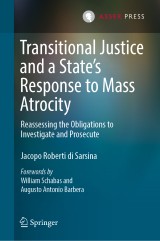Details

Transitional Justice and a State's Response to Mass Atrocity
Reassessing the Obligations to Investigate and Prosecute|
160,49 € |
|
| Verlag: | T.M.C. Asser Press |
| Format: | |
| Veröffentl.: | 26.03.2019 |
| ISBN/EAN: | 9789462652767 |
| Sprache: | englisch |
Dieses eBook enthält ein Wasserzeichen.
Beschreibungen
<p>This book brings a new focus to the ongoing debate on holding perpetrators of massive humanitarian and human rights violations accountable in countries in transition. It provides a clear-cut and comprehensive legal analysis of the content and nature of a state's obligations to investigate and prosecute as enshrined in the most important humanitarian and human rights treaties; it disentangles the common fallacy that these procedural obligations are naturally rooted and clearly spelled out in the general human rights treaties; and it explains the flaws in an absolutist interpretation. This analysis serves to understand whether such procedural obligations, if narrowly construed, act as impediments to countries emerging from periods of conflict or systematic repression in the face of contingent circumstances and the formidable dilemmas raised by a univocal understanding of justice as retribution.</p><p>Exploring the latest instances of interpretation and application via an analysis of state practice, the jurisprudence of treaty bodies, international courts and tribunals, soft law instruments, and doctrinal contributions, the book also addresses the complex issue of amnesty, and other transitional justice mechanisms designed to restore peace and facilitate transition traditionally included in national reconciliation programs, and criticizes the contention that amnesty is always prohibited by international law. It also considers these problems from the viewpoint of the International Criminal Court, focusing on the cases of Uganda and Colombia after the 2016 peace agreement.<br></p><p>Lastly, the volume offers a detailed analysis of techniques that may neutralize relevant obligations under international law, such as denunciation, derogation, limitation, and the public international law defenses of force majeure and necessity. Drawing attention to the importance of a multidisciplinary and practical approach to these unsettling questions, and endorsing a pluralistic notion of accountability, the book will appeal to legal scholars and transitional justice experts as well as practitioners, human rights advocates, and government officials.<br></p><p><b>Dr Jacopo Roberti di Sarsina </b>is an International Law Expert at the Alma Mater Studiorum - University of Bologna School of Law, and a dual-qualified lawyer (Italy and New York). He completed a PhD in public international law, label Doctor Europaeus, at the School of International Studies, University of Trento, holds an LLM from NYU School of Law, and read law at the University of Bologna.</p>
<p>Chapter 1. Introduction.- Chapter 2. The Content of the Obligations to Investigate and Prosecute International Humanitarian Law Violations – The 1949 Geneva Conventions and the Additional Protocols.- Chapter 3. The Content of the Obligations to Investigate and Prosecute International Human Rights Law Violations.- Chapter 4. International Law and Transitional Justice: The Difficulties of Abiding by the Obligations to Investigate and Prosecute in Countries Facing a Transition.- Chapter 5. State’s International Responsibility for Failing to Investigate and Prosecute Mass Atrocities: Are there Techniques within International Law to Solve the Dilemmas Raised by Transitions?.- Chapter 6. Conclusions.</p>
<p>This book brings a new focus to the ongoing debate on holding perpetrators of massive humanitarian and human rights violations accountable in countries in transition. It provides a clear-cut and comprehensive legal analysis of the content and nature of a state's obligations to investigate and prosecute as enshrined in the most important humanitarian and human rights treaties; it disentangles the common fallacy that these procedural obligations are naturally rooted and clearly spelled out in the general human rights treaties; and it explains the flaws in an absolutist interpretation. This analysis serves to understand whether such procedural obligations, if narrowly construed, act as impediments to countries emerging from periods of conflict or systematic repression in the face of contingent circumstances and the formidable dilemmas raised by a univocal understanding of justice as retribution.</p><p><br></p><p>Exploring the latest instances of interpretation and application via an analysis of state practice, the jurisprudence of treaty bodies, international courts and tribunals, soft law instruments, and doctrinal contributions, the book also addresses the complex issue of amnesty, and other transitional justice mechanisms designed to restore peace and facilitate transition traditionally included in national reconciliation programs, and criticizes the contention that amnesty is always prohibited by international law. It also considers these problems from the viewpoint of the International Criminal Court, focusing on the cases of Uganda and Colombia after the 2016 peace agreement.</p><p><br></p><p>Lastly, the volume offers a detailed analysis of techniques that may neutralize relevant obligations under international law, such as denunciation, derogation, limitation, and the public international law defenses of force majeure and necessity. Drawing attention to the importance of a multidisciplinary and practical approach to these unsettling questions, and endorsing apluralistic notion of accountability, the book will appeal to legal scholars and transitional justice experts as well as practitioners, human rights advocates, and government officials.</p><p><br></p><p>Dr Jacopo Roberti di Sarsina is an International Law Expert at the Alma Mater Studiorum - University of Bologna School of Law, and a dual-qualified lawyer (Italy and New York). He completed a PhD in public international law, label Doctor Europaeus, at the School of International Studies, University of Trento, holds an LLM from NYU School of Law, and read law at the University of Bologna.</p><div><br></div>
A clear-cut legal analysis regarding the debate on a State's obligations to investigate and prosecute serious violations of humanitarian and human rights law in countries in transition Comprehensively analyzes these obligations to investigate and prosecute In a departure from the majority view, it adopts a critical and nuanced approach firmly based on a classic international law methodology Sheds light on the 2016 Colombian Peace Agreement as a potential new paradigm Draws attention to the importance of a multidisciplinary approach squaring international law with international politics Hailed as "rigorous", "solid", of "excellent quality", and "exceptionally well researched"
Diese Produkte könnten Sie auch interessieren:

Spreading Democracy and the Rule of Law?

von: Wojciech Sadurski, Adam Czarnota, Martin Krygier

149,79 €















